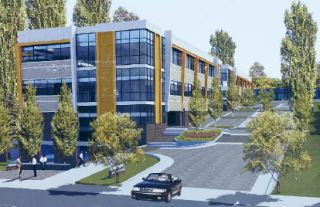The architects of the Boys and Girls Club’s proposed PEAK project recently presented an updated design of the facility that showed trees were the better screen for neighbors to the west, while the city’s Design Commissioners asked to see more interactive features in the formal review process.
During its second study session before the Design Commission last Wednesday, Ed Weinstein, the lead architect of Weinstein AU, told Commissioners that his team had looked at breaking up the west façade of the proposed 18,000-square-foot fieldhouse, but recommended a thick screen of various conifers. The 180-foot-long wall would be parallel to 86th Avenue S.E. across from several homes.
Weinstein also showed that his firm had broken up the roof line and façade by dividing it into three sections with two linear delineations, one every 60 feet.
“This is easy to do for us because inside there are three basketball courts, each 60 feet wide,” he said.
The Design Commission had previously asked Weinstein to consider more than simply covering the wall with trees and to break up the façade using architectural techniques. Showing a graphic simulation of 15-foot-tall trees to be bought and planted beside the fieldhouse, Weinstein said his firm decided that screening the facility would serve the neighborhood better than breaking up the façade. The alternative design showed the façade broken up with two concrete walls in front of exiting stairwells, making little change in the appearance of the large metal wall.
“Such large walls are problematic to clad,” he said. “Stucco has a maintenance liability, the wall can’t be wood, and we can’t afford a brick façade. Metal comes to mind as perfect element for cladding. We use it a lot on civic buildings.”
Councilmember Dan Grausz, the liaison to the Commission, suggested the Commissioners take notice to public testimony expected during the comment period once official review begins.
“Hopefully neighbors will weigh in what they want,” said Grausz.
Design Commissioners also stated they would like more attractions near the main entrance. Both Commissioners Lucia Pirizio-Biroli and Scott Kuzniki offered insights to improving the entrance.
“You could activate the space so it appears to be a real drop-off and pickup area. It would be really nice to provide some outdoor amphitheater or plaza so when it’s sunny, kids could hang out there in the sun,” said Pirizio-Biroli.
Outgoing Commissioner Wittman, who is finishing up his second four-year term on the Commission, also suggested a change in color used with the facility. He said he would like to see the high school colors and youth sport’s clubs maroon.
“I really like the yellow with the grey metal, it’s a very modernistic color combination, but maybe you could change the colors to maroon in keeping with the high school colors that are prominent with public entities on the Island,” said Wittman.
Formal design review would begin after the Club submits a final application for the project.
Office building approved
A 21,000-square-foot office building to neighbor City Hall was approved by the Design Commission last Wednesday. The office will join the former Honeywell building located on the property today at 9545 S.E. 36th Street, and will include a two-story parking garage.
Graphics of the project depict a heavily windowed structure surrounded by several planters and trees. The building will provide two stories of office space, which will taper into the sloped property. Public and tenant amenities include a small public plaza off S.E. 36th Street and a connecting nature trail along a stream that divides the complex with City Hall.
Commissioner Scott Kuzniki suggested the developers add something to the pedestrian plaza to protect it from cars.
“It looks an awful lot like a driveway. Maybe you could add two or three bollards to prevent cars from driving down in there,” said Kuzniki.
Developers and the city are also negotiating the terms for an easement that would provide construction access from City Hall. A driveway connecting the two properties is sought by the developers to facilitate construction vehicles, which would be converted to emergency vehicle access once the project was completed.
Another suggestion was to add planters or a sculpture to distinguish the plaza. Commissioners added in their approval that something be done and approved by city planners to identify the public space that also would notify drivers it was not the entryway.
Although she voted in favor of the project, Commissioner Lucia Pirizio-Biroli, a professional architect, expressed some distaste with the new structure.
“The problem with this building is that the material looks so office park like. It’s so plastic, that’s the thing,” she said.
The project will be constructed between two protect streams on the property, an issue that required a long, skinny design. Pirizio-Biroli said she wanted to break up that long façade, suggesting the developer use as many different siding materials as possible.
“I’d like to see you reduce the horizontal aspect,” she said. “The building feels like a long train.”
However, other commissioners were more satisfied with the project.
“I want to have an office there. I like it,” said Commissioner Emmett Maloof.



